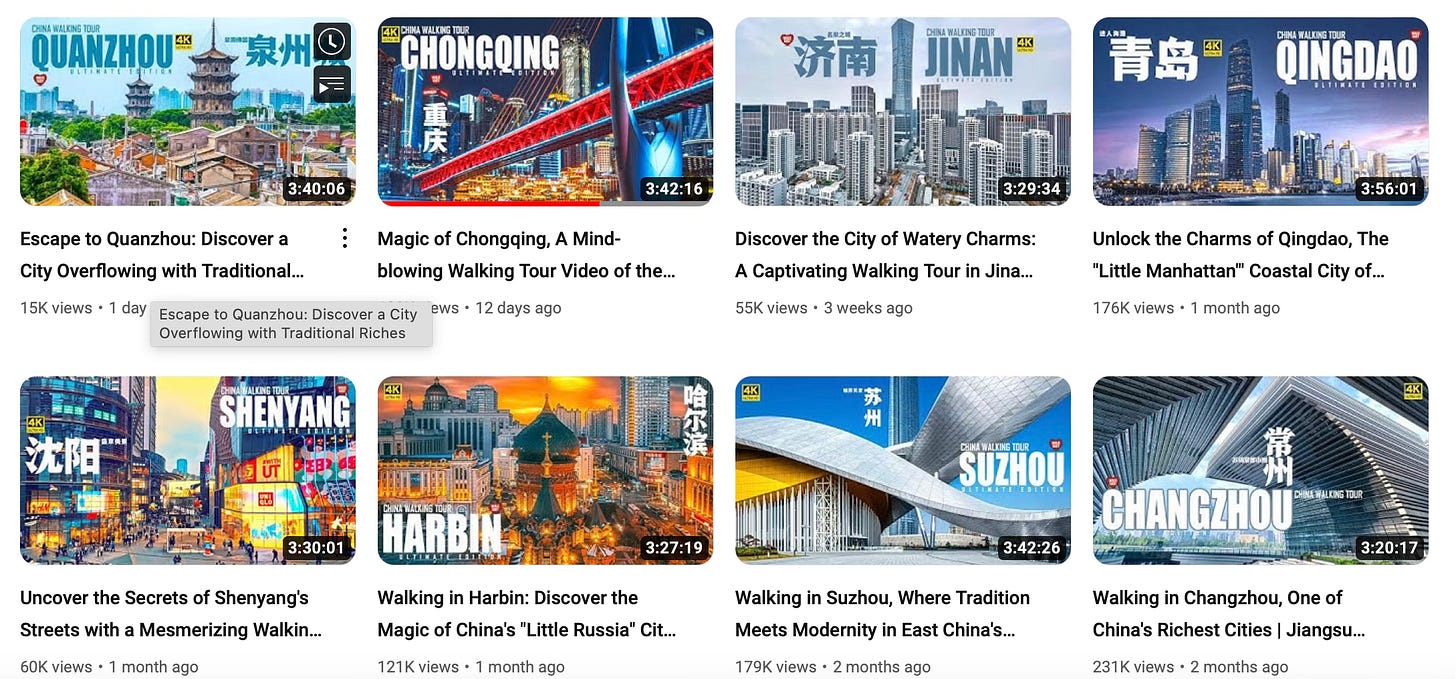Omnipedia #35: Stargazing, both pagan and NATO; China & Gulf Futurism; hyper-moral AIs and good COPs--and more
Including: digital sentience, by means of Taylor Swift and Wittgenstein's lion
We’ve been moving house to the Sensuous Republic of Leith, Edinburgh, so please accept many apologies for the delay on this Omnipedia. But we see light glimmering between the moving crates, so are now able to send this out. Hope you enjoy, do consider supporting with a "Upgrade to Paid” (see button below), and see you at the end. — PK
Sometimes you just need some documentary strangeness… On Clogger Lane (excerpt above), by Andrew Black, deep dives into Washburn Alley in Yorkshire. The place home to two types of planetary signalling equipment. One is star-charting Neolithic “cup and ring” marks, charting the stars. This sits next to the white radomes of the US spy base at Menwith Hill. Keir Milburn has written an essay for it, and you should try to watch the whole doc. Clanking soundtrack, peace activists narrating, terror-movie cinematography. What’s not to love?
This YouTube channel Walk East recalls a zinger from that ol’ globaliser Thomas Friedman: “landing at Kennedy Airport from Hong Kong was like going from the Jetsons to the Flintstones”. What is it like at ground-level in a Chinese city? Does the cartoon comparison still pertain? I am interested in obliquely positioned China-watchers, like the eco-designer John Thackara, and the writer/editor Jacob Dreyer.
An old friend of mine, Sophia Al-Maria, named the “Gulf Futurism” aesthetic - “evident in a dominant class concerned with master-planning and world-building, while the youth culture preoccupied with fast cars, fast tech and viddying a bit of ultra-violence”. So what kind of futurism is China Futurism?
Glad to read this, from Paul Bloom in the New Yorker, on the AI alignment issue. Why don’t we treat artificial minds as possibilities for moral and ethical advance? Do we want them to “align” with our petttiness, vengefulness, spite or nihilism?
Would humans ever live by values that are supposed to be superior to our own? Perhaps we’ll listen when a super-intelligent agent tells us that we’re wrong about the facts—“this plan will never work; this alternative has a better chance.” But who knows how we’ll respond if one tells us, “You think this plan is right, but it’s actually wrong.” How would you feel if your self-driving car tried to save animals by refusing to take you to a steakhouse? Would a government be happy with a military A.I. that refuses to wage wars it considers unjust?
If an A.I. pushed us to prioritize the interests of others over our own, we might ignore it; if it forced us to do something that we consider plainly wrong, we would consider its morality arbitrary and cruel, to the point of being immoral. Perhaps we would accept such perverse demands from God, but we are unlikely to give this sort of deference to our own creations. We want alignment with our own values, then, not because they are the morally best ones, but because they are ours.
I wrestle everyday with my catastrophism about climate, so I was delighted to read this personal essay on COP28, by the green business writer James Murray. I know colleagues like Rupert Read wish the event to be proclaimed a disaster, so that climate-oriented citizens stop misdirecting their activist energies into executive politics. But I also appreciate this kind of idealism:
This is why COP28 and the entire UN climate process matters so much: at a time when too many countries are at each others' throats, when great powers jostle for primacy and their proxies unleash horrors, this is a peace summit. It is a mechanism for multilateralism and the recognition of both shared humanity and aligned self-interest. It is a forum that seeks to tap the qualities we all try to teach the next generation, and yet too easily let slip: patience, empathy, responsibility, perseverance, resilience, trust, respect, kindness.
As Pete Betts - the recently departed and much missed British diplomat and veteran of countless COPs - used to say of the UN climate talks: "We didn't always agree, but we trusted the other side enough to know that if they said something, it was because they had reasons to say it and you had to listen."
This is a tiny corner of the AGI debate, but I know of no-one else than Mark Solms who is even close to this question: How can these systems develop goals, intent and awareness, as an outcome of “feeling” their needs?
Here’s a recent commentary from Mark on this paper by Karl Friston et al. The Friston paper is full of slabs of mathematics that will forever be impenetrable to me… But the prose parts suggest that there can be a mathematically-proven “interior” to any entity - if it is contained within a “Markov blanket”.
But something else struck me this fortnight: why wouldn’t a network of wires, glass and metal be an umwelt, an experienced world, for an AGI - just in the same way a powerful body in the savannah is an umwelt for a lion? And are we ready for the fact, that like Wittgenstein’s lion, we may not understand an AGI if it truly spoke about, and from, its experience?
Never mind AI as the next stage in evolution. Is AI the coming raiment for superstardom? Or maybe the “omnistar” - as the Economist has gamely tried to name it - is a jazz-hands route to that very evolutionary leap? What happens when endless simulations of the “character” of A- and B-listers put some texture into the probability-machines of current AI?
Or would we just become bored of all this plausible digital fakery, and crave to be in a room with sweaty performers, answering our “lust for live” (which I’m tracking)?
The august Economist seems to concur with me at the end of the piece:
…Even as ai-powered entertainment grows, consumers still seem to relish human drama. Sport, perhaps the most ai-proof, flesh-and-bones spectacle there is, has seen its value to media companies soar in recent years (meanwhile, no one watches computer-powered chess, though its best players could beat any human). Moreover, ai will make entertainment’s long tail even longer, with deeper niches and more personalised content. In the ai age, audiences will face heavy bombardment from a handful of omnistars, from Taylor Swift to Darth Vader. But it will be easier than ever for them to change the channel.
Finally…extruded! Sorry for omission of Scotgeist section, but for it we have bigger 2024 plans… watch this space. A happy and unrelentingly meaningful New Year to you all, much love, PK x





